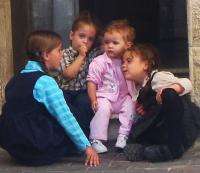December 9, 2009 weblog
Birth order affects cooperation in later life

(PhysOrg.com) -- A new scientific study has found that at least some of the stereotypes associated with older siblings are true: the oldest sibling is often less trusting, less cooperative, and less reciprocating than younger siblings.
There has been a debate about the importance or otherwise of birth order for many decades, with some psychologists arguing youngest and oldest siblings receive more attention from parents than a middle-born child, leaving the one in the middle to seek attention outside the family, and hence becoming more social.
These speculations have been based largely on self-questionnaires and surveys of family and friends of the siblings, but researcher Alexandre Courtiol, an evolutionary biologist at the University of Montpellier 2 in France, wanted a more objective method of testing the hypothesis. So Courtiol and colleagues invented an investment game.
The two-player game was played by 510 unrelated students. Each player began with a pool of three Euros, with player A taking on the role of investor, and B playing the banker. Player A could give any portion of the pool to the banker, who would then triple it. Player B could then return any portion of the now much larger pool to the investor. Since the banker was free to return little or nothing to the investor if he wished, the amount A gives to B is a measure of trust, and the amount B returns to A is a measure of reciprocity.
Each of the student volunteers was randomly assigned the part of player A or B and told they would not meet the other player. To remove any influence of the random behavior of a real person, each of the players was actually unknowingly playing a fictitious opponent.
The results, which are published in the December issue of Animal Behavior, were analyzed in relation of the birth order of the student players, and the researchers found that for player A (investor), the firstborns were less trusting than laterborns, and sent 25% less money to the banker. Firstborns who played the banker also reciprocated less, returning 22-29% less to player A.
The results were also analyzed in relation to gender, income, and religious beliefs, but the research team found that birth order was the stronger factor.
One possible reason for firstborns being less trusting and less reciprocating than their younger siblings is that as new siblings arrive, they demand and receive more attention from the parents, and the firstborn has to compete for attention and may become less cooperative. This explains the study's other finding, that students who had no siblings behaved like laterborns, suggesting the behavior is a result of the arrival of later siblings rather than of being the firstborn.
Courtiol said the results must be regarded with caution since although birth order was found to be the stronger factor, it still explained less than 10% of the variance in the behavior in the game.
The finding that laterborn siblings cooperate more than firstborns may explain why they tend to be bigger risk-takers, according to the University of California's Frank Sulloway, an evolutionary psychologist. Sulloway said that cooperation is often risky because it is not always reciprocated.
The study presents some of the first experimental evidence that birth order can continue to influence adult behavior, and is an important step in understanding the evolution of human cooperation and trust.
More information: Birth order affects behaviour in the investment game: firstborns are less trustful and reciprocate less, Animal Behaviour, Volume 78, Issue 6, December 2009, Pages 1405-1411; doi:10.1016/j.anbehav.2009.09.016
© 2009 PhysOrg.com
















